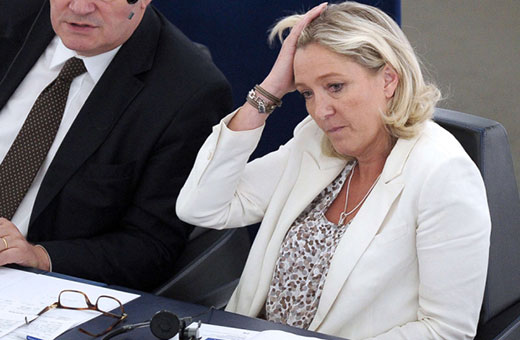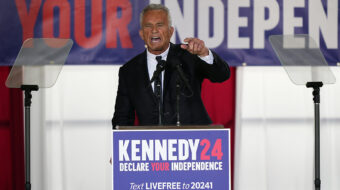
On Sunday, the second round of municipal elections in France’s 36,000 local councils delivered a drubbing to President Francois Hollande’s Socialist Party as the right wing UMP (Union for a Popular Movement) declared victory and the far right National Front surged.
There were two reasons for this disaster for the socialists. First the ultra right, in the case of France represented by the National Front headed by Marine LePen, has been surging all over Europe. As well as scapegoating immigrants, Roma, Muslims, gays and other minorities, sometimes including Jews, these right wing parties attack the institutions of the European Union.
In France, the effort to legalize same-sex marriage and related issues has been the focus of a big right wing organizing campaign for over a year, with mass marches of conservative Catholics.
The second reason was that, having run “from the left” in the 2012 national elections, the Socialist Party president, Mr. Hollande, immediately tacked right once in power and followed policies which, in the public’s eye, too much resembled those of his right-wing predecessor, Nicolas Sarkozy of the UMP. On international issues, Hollande has been an aggressive booster of French intervention in Africa and NATO intervention in Libya, Syria and Ukraine. On economic policy, Hollande has toed the line of the European Central Bank, International Monetary Fund and European Union, with austerity and anti-labor policies that have hurt and angered French workers. These policies were supposed to boost production but factories are closing and unemployment has been stuck at around 11 percent.
The voting base of the Socialist Party felt betrayed and stayed home, contributing to a 38 percent abstention rate, very high for France. As voters who previously voted for the Socialist Party abstained, the UMP and the National Front advanced, the latter especially in distressed industrial areas with high unemployment. The socialists lost control of 155 substantial towns, with the National Front winning in 11, and the UMP taking most of the rest.
The “left of the left” which is what the French call the Communist Party and other groups to the left of the Socialists, also denounces the policies of the European Union, European Central Bank and International Monetary Fund, which it depicts as constituting an attack on the working class and small producers in all the European countries. The Communists criticize the policies of Mr. Hollande for catering to those institutions. But the communists and their allies refuse to engage in the scapegoating of minorities and immigrants, and call for more unity of the working class across borders, as well as support of full rights for gays including same-sex marriage.
Election results for the Communist Party and the Left Front (Fronte Gauche) were mixed. Though they did not suffer the same pounding that the Socialist Party did, they had some losses and they did not advance. The reasons for their mediocre showing are now being analyzed. There is a debate about the wisdom of the Communist Party’s having allowed its local organizations in each “commune” (local government district) to make its own united-front arrangement with other parties, including the Socialists, according to local situations. Thus, in some communes, the French Communist Party and Hollande’s Socialist Party backed one candidate. In Paris, for instance, the Communist Party threw its support to the Socialist Party mayoral candidate, Anne Hidalgo, who beat the right wing UMP candidate with 54 percent in Sunday’s runoff and becomes the first woman mayor of the capital.
In other areas, Communist candidates and candidates of the Left Front (of which the Communist Party is also a component) competed with each other. In spite of France having runoff elections, this created friction between campaigns and perhaps some confusion among voters.
Hollande’s response to the election results seems to be to turn even more to the right. He accepted the resignation of his prime minister, Jean-Marc Ayrault, and replaced him with Interior Minister Manuel Valls, who is considered to be further to the right and who has taken a leaf from the book of former right-wing President Nicolas Sarkozy by targeting Roma and immigrant communities for repressive state action.
The appointment of Valls disturbed some in the left wing the Socialist Party, and the three Green Party members of Hollande’s cabinet are decamping. On the “left of the left”, the move was sharply denounced.
The Communist Party’s First Secretary, Pierre Laurent, forthrightly denounced the entire “lean right” strategy of the Hollande government and called for a “change of course to the left”. “Francoise Hollande has not heard the message of the French people” Laurent said. “The change of course is more urgent than ever!”.
Jen-Luc Melenchon, co chair of the Left Front, who was their candidate and that of the Communist Party in the 2012 presidential election, urged the French people to turn out for massive demonstrations on April 12 to oppose the right wing policies of the government.
Photo: Massive abstention from the vote by pro-socialist voters led to advances for Marine LePen’s National Front, an exteme right-wing political party. AP

MOST POPULAR TODAY

High Court essentially bans demonstrations, freedom of assembly in Deep South

UN warns that Israel is still blocking humanitarian aid to Gaza


Resource wars rage in eastern Congo, but U.S. capitalism only sees investment opportunity

U.S. imperialism’s ‘ironclad’ support for Israel increases fascist danger at home






Comments